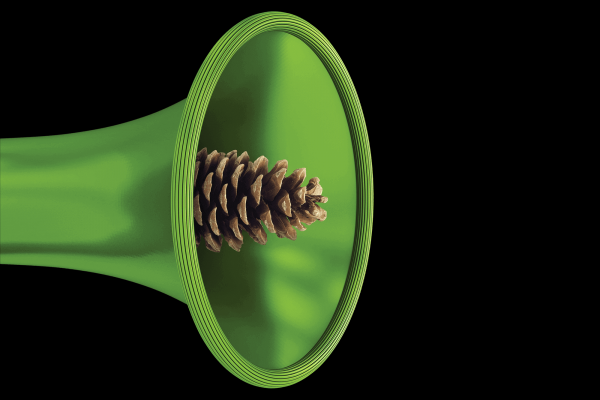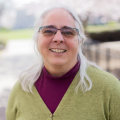DEEP IN OLYMPIC National Park in Washington is the quietest place in the United States. In 2005, one square inch of Hoh Rain Forest—marked by a small red stone—was designated for sound protection.
The logic is simple, according to acoustic ecologist Gordon Hempton: If anthropogenic (human-caused) noise can impact many square miles, as scientists have observed, then a natural point of silence, protected from such sound, can also impact many square miles around it.
Preserving natural silence and setting limits on our human sonic footprint, on land and underwater, is a leading edge of ecological practice and regulation. Similar to the dark-sky movement to reduce light pollution, Hempton cofounded Quiet Parks International to defend natural silence.
For billions of years, the Earth was very quiet. Only the low pounding of waves, rivers of wind, thunder. No birdsong, no frog choruses, no insect beatbox. With flowers came winged pollinators and, eventually, an explosion of nature’s creaturely orchestral arrangements.
For hundreds of thousands of years, humans were a quiet species, says biologist David G. Haskell. With the development of mammalian lactation, our throats began to shape for more sophisticated sound. “The subtlety and range of human speech and the resulting triumphs of vocal culture are bequests of ancient mothers,” writes Haskell.
The civilizational legacies of human speech surround us—tottering between the colonizers’ avaricious command for “more” and the colonizeds’ exhausted roar for “freedom”—but our ancient biblical stories remind us how complicated silence is and that some transformations emerge only in silence. There is the primordial silence of creation before God first speaks; 90-year-old Sarah laughs silently (“within herself,” Genesis 18:12) at the birth news of Isaac, imposes on Hagar the silence of exile, and fails to speak against the sacrifice of Isaac. Jeremiah desires an ashamed silence from the people of Judah at the depth of their betrayal (Jeremiah 8:14). And Habakkuk puts finger to lips for a sacred hush: “But YHWH is in the Holy Temple: let all the earth be silent in God’s presence” (2:20).
Mary offers a deliberative silence at the shepherds’ news about the fate of her child (Luke 2:19). Jesus’ silence before Pilate is loud, bold, explicit (Luke 23:9). There is the agonizing silence following the rattle of Jesus’ last breath (Mark 15:37); Peter’s bitter silence on hearing the cock crow; and the lockdown silence imposed by Paul on the prophesying women of Corinth (1 Corinthians 14:34). Finally, there is the great “silence in heaven for about half an hour” (Revelation 8:1) following the tortured Lamb breaking open the seventh seal—it took half an hour for the prayers of the saints to rise on incense to the ears of God. This is the cosmic liturgical silence kept before unleashing the first brassy bump from Gabriel’s horn and rising ululation of alleluias.
Jewish poet Hayim Nahman Bialik reminds us, “Before God there are yet other languages than those of words.” Cultivate your own generative silence. Find the quietest place within yourself and defend it. We may need to learn again how to be a quiet species.

Got something to say about what you're reading? We value your feedback!







